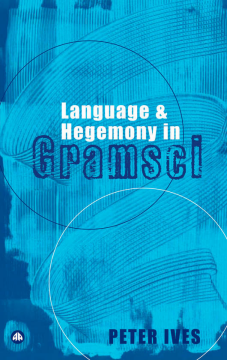
Additional Information
Book Details
Abstract
Language and Hegemony in Gramsci introduces Gramsci’s social and political thought through his writings on language. It shows how his focus on language illuminates his central ideas such as hegemony, organic and traditional intellectuals, passive revolution, civil society and subalternity. Peter Ives explores Gramsci’s concern with language from his university studies in linguistics to his last prison notebook. Hegemony has been seen as Gramsci’s most important contribution, but without knowledge of its linguistic roots, it is often misunderstood.
This book places Gramsci’s ideas within the linguistically influenced social theory of the twentieth century. It summarizes some of the major ideas of Ferdinand de Saussure, Ludwig Wittgenstein, language philosophy and post-structuralism in relation to Gramsci’s position. By paying great attention to the linguistic underpinnings of Gramsci's Marxism, Language and Hegemony in Gramsci shows how his theorization of power, language and politics address issues raised by post-modernism and the work of Michel Foucault, Jacques Derrida, Chantal Mouffe, and Ernesto Laclau.
Table of Contents
| Section Title | Page | Action | Price |
|---|---|---|---|
| Contents | v | ||
| Introduction | 1 | ||
| The pervasiveness of Gramsci’s hegemony | 2 | ||
| 1. Language and Social Theory: The Many Linguistic Turns | 12 | ||
| Language, production and politics in the twentieth century | 12 | ||
| The many linguistic turns | 15 | ||
| Saussure's structural approach to language | 16 | ||
| The structuralist turn towards language | 21 | ||
| Philosophy's 'linguistic turn' | 25 | ||
| The many other 'linguistic turns' | 29 | ||
| Marxism and language | 29 | ||
| Conclusion | 31 | ||
| 2. Linguistics and Politics in Gramsci's Italy | 33 | ||
| Gramsc's home, Sardinia | 34 | ||
| The Southern Question and the Risorgimento | 35 | ||
| The Language Question | 36 | ||
| Gramsci's youth | 38 | ||
| Beyond the Wide Waters | 41 | ||
| Gramsci's linguistics | 43 | ||
| Italian linguistics | 44 | ||
| Bartoli's polemic against the Neogrammarians | 47 | ||
| Summary of various approaches to Language | 54 | ||
| Gramsci and Esperanto | 55 | ||
| Conclusion | 61 | ||
| 3. Language and Hegemony in the Prison Notebooks | 63 | ||
| Approaching the Prison Notebooks | 64 | ||
| Non- linguistic understandings of hegemony | 67 | ||
| Two broad themes in hegemony | 70 | ||
| Gramsci's expansion of 'politics' | 72 | ||
| Language, philosophy and intellectuals | 72 | ||
| Subalternity and fragmented 'common sense' | 77 | ||
| Language, nation, collective popular will | 82 | ||
| Language and metaphor | 84 | ||
| The structures of language | 89 | ||
| Two grammars of hegemony | 90 | ||
| Spontaneous grammar | 90 | ||
| Normative grammar | 92 | ||
| Normative history in spontaneous grammar | 96 | ||
| Normative grammar and progressive hegemony | 98 | ||
| Conclusion | 101 | ||
| 4. Gramsci's Key Concepts, with Linguistic Enrichment | 102 | ||
| Passive revolution and ineffective national language | 102 | ||
| War of manoeuvre and war of position | 107 | ||
| War of position as passive revolution | 109 | ||
| National-popular collective will | 110 | ||
| War of position and new social movement alliances | 112 | ||
| Language as a model for the national Πpopular collective will | 113 | ||
| Hegemony, political alliances and the united front against Fascism | 114 | ||
| State and civil society | 116 | ||
| The history of state and civil society | 117 | ||
| The state | 119 | ||
| Conclusion | 125 | ||
| 5. Postmodernism, New Social Movements and Globalization: Implications for Social and Political Theory | 126 | ||
| Postmodernism, language and relativism: is all the world a text? | 128 | ||
| Nietzsche, Saussure and Derrida on language | 131 | ||
| Language and relativism in Gramsci | 135 | ||
| Foucault, language and power | 138 | ||
| Power in Gramsci and Foucault | 141 | ||
| New social movements and discourse: Laclau and Mouffe | 144 | ||
| Laclau and Mouffe's linguistically informed 'Hegemony' | 153 | ||
| Globalization | 160 | ||
| Notes | 166 | ||
| Bibliography | 187 | ||
| Index | 195 |
